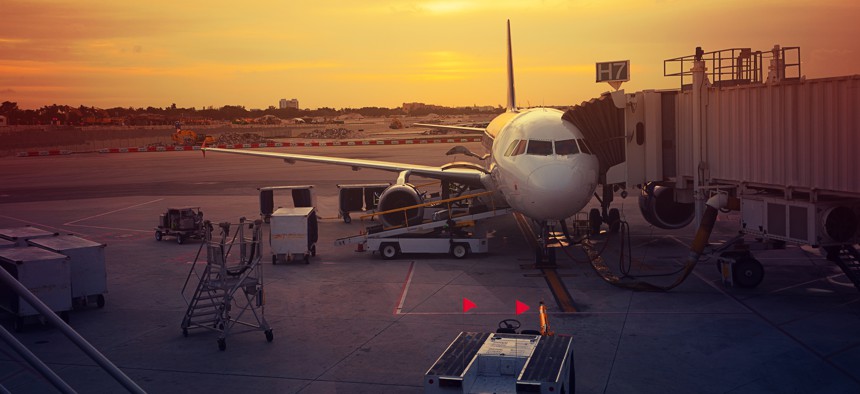FAA boosts airport infrastructure with nearly $1B in grants

The airport in Fort Lauderdale, Florida, above, secured the most money in this round of awards, with a $50 million grant to help connect its three terminals with walkways inside secured areas. THEPALMER via Getty Images
The money, which is part of the 2021 federal infrastructure law, will help airports accommodate more passengers, make their facilities more accessible to people with disabilities and prepare for climate change.
More than 100 airports across the country are set to get upgrades to their terminals, security checkpoints, baggage systems and air traffic control towers, the Biden administration announced Thursday.
The Federal Aviation Administration doled out $970 million in grants to airports that were included as part of the 2021 federal infrastructure law. This year’s grants—the third of five yearly rounds of awards—went to facilities in 44 states and three territories.
“Today’s funding not only helps modernize airports to meet the needs of travelers today and for years to come but also creates good-paying job opportunities in communities both large and small,” Shannetta R. Griffin, the FAA’s associate administrator for airports, said in a statement.
Air travel demand has been steadily increasing since its dip to nearly zero during the early days of the pandemic. Last year, the U.S. aviation industry celebrated its busiest year ever for air travel with 16.3 million flights. To meet the growing demand, airports across the country are scrambling to update aging infrastructure and plan necessary expansions.
The airport in Fort Lauderdale, Florida, secured the most money in this round of awards, with a $50 million grant to help connect its three terminals with walkways inside secured areas.
Chicago’s O’Hare International Airport landed another $40 million to widen a terminal primarily used by American Airlines, reconfigure a security checkpoint, make restrooms more accessible and upgrade its baggage system. That’s on top of a $50 million grant it took home last year for similar work.
Austin’s airport received $39.5 million to help with its expansion plans. Phoenix will get $36 million for its heating and cooling systems. Los Angeles brought in $31 million to help with its plan to consolidate rental car operations and taxi and shuttle connections away from its main terminal. Dulles International Airport in the Virginia suburbs of Washington, D.C., secured $35 million to help build a new 14-gate terminal building. And Raleigh-Durham, which missed out on last year’s funding for the Airport Terminals Program, fared better this year by garnering $12 million for terminal improvements.
More than 600 airports applied for the grants this year, with requests totaling $14 billion. The FAA chose 114 of those for funding.
Many of the grants were designed to help airports be more resilient as climate change threatens their infrastructure.
Louis Armstrong International Airport in New Orleans, for example, received $7 million to build a road on pilings designed to better withstand hurricanes and other climate events that have deteriorated the surrounding soil. The road will allow airport shuttles to travel between the new passenger terminal and existing parking facilities (and one day, an intermodal center with a rail connection) without clogging up local roads. The airport also received $8 million last year for the project, which officials anticipate will cost a total of $97 million.
The FAA awarded $21.4 million for an airport in Guam to replace a terminal roof, which the agency says will ensure “uninterrupted operations and passenger safety after natural disasters.” The Antonio B. Won Pat International Airport flooded last year after the Typhoon Mawar struck the Pacific territory in May, dumping more than two feet of rain on parts of the island.
In Kentucky, the Louisville Muhammad Ali International Airport, also known by its identification code SDF, received two grants totaling $13 million, including security improvements and $5.5 million to build a microgrid that would allow the airport to function better during emergencies.
U.S. Sen. Mitch McConnell, the leader of the chamber’s Republican caucus and husband of former Transportation Secretary Elaine Chao, praised the grants. “This federal funding will enhance safety for both passengers and personnel and is critical for the airport’s continued operation,” he said in a statement. “I’m pleased to see today’s investment go to good use at SDF, and I’m proud the bipartisan infrastructure bill I negotiated continues to deliver wins for Kentucky’s communities.”
Daniel C. Vock is a senior reporter for Route Fifty based in Washington, D.C.
NEXT STORY: A decade in, pedestrian deaths dip under Vision Zero






